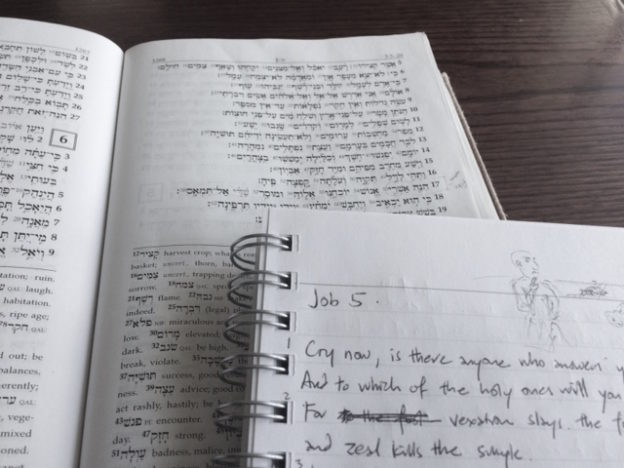Ten days in Job so far. I’m appreciating the slower pace and the time to think about Eliphaz’s words and why they sound good but don’t help.
Previously: Job 1:1-5 | Job 1:6-12 | Job 1:13-22 | Job 2:1-6 | Job 2:7-13 |
Job 3:1-10 | Job 3:11-26 | Job 4:1-21 | Job 5:1-7
Translation:
8 But I would seek out God,
and to God would I set my plea,
9 He does great things — unsearchable,
marvellous things without number.
10 Giving rain upon the surface of the earth,
and sending waters over the surface of the fields.
11 He sets the lowly on heights,
and those who mourn He lifts to happiness.
12 He frustrates the thoughts of the crafty,
and their hands do not make success.
13 He catches the cunning in their craftiness,
and the counsel of the astute are hastened [to conclusion].
14 By day they encounter darkness,
and as by night do they grope at midday.
15 But He saves the needy from the sword, from their mouth,
and from the hand of the mighty.
16 And the helpless have hope,
and malice shuts her mouth.
- Eliphaz continues reciting his prepared-sounding remarks to his suffering friend Job – he encourages him to “seek out God” (v8), then extols His great character (v9-11), and delights in His retributive nature (v12-16). Eliphaz seems to love waxing lyrical about and orderly and lawful God.
- The quality of the poetry is quite remarkable, and comes across as polished and prepared. They’re beautiful words, yet badly wielded. Job needs a friend, not a lecture.
17 Look, blessed is the man whom God chastens,
So do not refuse the training of “Shaddai” (Almighty)!
18 For He causes pain, yet binds up,
He shatters, yet His hands heal.
19 From six troubles He will deliver you,
and in seven, evil will not touch you.
20 In famine He redeems you from death,
and in war from the hand of the sword.
21 From the whip of the tongue you shall be hidden,
and you shall not fear devastation when it comes.
22 Towards oppression and famine you shall laugh.
And from the beasts of the earth you shall not fear.
23 For with the stones of the field you shall covenant with,
and the beasts of the field shall be at peace with you.
24 You shall know that peace [is] your tent,
and you shall deal with your settlement and not miss the mark.
25 You shall know that many are your offspring
and your offspring [be] as weeds of the earth.
26 You shall come to the grave in ripe [old] age,
as a sheaving of sheaves in its time.
27 Look, this is what we have explored,
it is thus so: hear it, and know it for yourself.
- Eliphaz concludes his monologue by exhorting Job: see your trials as punishment from God! Don’t reject it! (v17).
- He saves his biggest words for this climactic moment, invoking a cluster of righteous-sounding vocabulary: blessed (v17, like “Blessed is the man” in Psalm 1), redemption (v20), covenant (v23), shalom / peace (v23-24), and even sin (v24, “miss the mark”). Nothing quite like a bit of Hebrew-ese to really drive home the point that he’s right, huh?
- It’s almost as if Eliphaz is referencing the Abrahamic blessing (Genesis 15) and invoking the same ideas and hopes (land and offspring and protection) – e.g., verse 25, “your offspring will be as weeds on the earth.” I’m not sure whether that’s the best thing to say to someone who’s just lost 10 kids though. Can’t you just grieve with him?
Some reflections:
- When I’m chatting with grieving friends, righteous-sounding Christianese can get in the way of showing real sympathy.
- I know I’m often prone to Eliphaz’s urge to give beautiful and pious-sounding advice when it’s poorly-timed. A friend told me once that when he was recovering in hospital, he got really tired of people who’d come up and just quote Romans 8:28 to him (and not much more). May we be more careful not just what we say, but when we say it, and how. “You’ll find that perfect someone, I know it!” is probably not helpful when your friend is mourning their singleness. Probably a dumb move to declare “He will not cause you to stumble” when your friend is terminally ill.
- I get that we should take time to weigh up differing viewpoints and commentary on the pandemic: from health officials, economists, etc. But Eliphaz’s mistimed verbosity reminds me that perhaps sharing yet another long-form COVID read isn’t the most important thing my anxious and suffering friends need to hear right now.
- “Be happy that God is disciplining you” might be something I’d say to myself after a harrowing trial. But it certainly shouldn’t be something I cough onto others without reason, and while they’re grieving, like Eliphaz does. Suffering brings lessons on hindsight — let’s not short-circuit that process for our friends with lofty but mistimed words.




